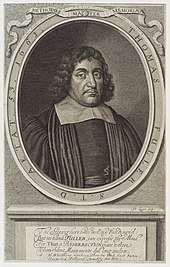Thomas Fuller
![]()
The title of this article is ambiguous. For other meanings, see Thomas Fuller (disambiguation).
Thomas Fuller (b. 1608 in Aldwinkle; † 16August 1661) was an English historian.
Thomas Fuller was the eldest son of the Reverend Thomas Fuller in Aldwinkle, Northamptonshire. He was born in his father's rectory and baptised on 19 June 1608. Dr John Davenant, later Bishop of Salisbury, was his uncle and godfather. According to John Aubrey, Thomas Fuller was a boy full of intellect and wit, and possessed of a very good memory, which he deliberately exercised. At the age of thirteen he was admitted to Queens' College, Cambridge. His cousin Edward Davenant was tutor there. Fuller was very successful and he was awarded the B.A. in the term 1624-1625 and the M.A. in July 1628. After being overlooked in an election of Fellows in the College, he moved to Sidney Sussex College, Cambridge in November 1628. In 1630 he became curate of St. Benet's, Cambridge, through Corpus Christi College.
Fuller soon attracted attention for his oratory. He published in 1631 the poems David's Hainous Sense, Heartie Repentance, Heavie Punishment, which are to be regarded as one work continuously, and deal with David, the king of Israel. In June of the same year his uncle gave him a benefice at Salisbury. There his father, who died in the following year, held the canonry.
The vicarages of Broadwindsor, Dorset, and then the headship of the diocese of Bristol (1634) showed his rise; and on 11 June 1635 he performed the function of B.D. at Broadwindsor. Here he wrote The Historie of the Holy Warre (1639), the history of the crusades, and The Holy State and the Prophane State (1642). This work, one of his most successful, describes the Holy State consisting of the family and the profession. The work prescribes rules of conduct and etiquette, as well as ideal characteristics for various professions and ways of life.

Thomas Fuller
Works
- Thomae Fulleri Pharmacopoeia extemporanea oder die sichere, vollständige und auserlesene Apotheke: woinnen mehr als tausend Hülfsmittel zu finden, die bei allen dem Menschen zustossenden Krankheiten, sicher und mit Nutzen gebraucht werden können; zum allgemeinen Besten der so auf dem Land und entfernten Orten wohnen. Basel: Im Hof, 1750. Digitized edition of the University and State Library of Düsseldorf.
- Pharmacopoeia extemporanea sive praescriptorum chilias: in qua remediorum elegantium & efficacium paradigmata, ad omnes fere medendi intentiones accommodata, candide proponuntur; cum viribus, operandi ratione, dosibus & indicibus annexis. Lovanii: Van Overbeke, 1752. Digitized edition of the University and State Library of Düsseldorf.
- The Life of Thomas Fuller, with Notices of his Books, his Kinsmen and his Friends (1874), by J. E. Bailey, with extensive bibliography (pp. 713-762) of his works at books.google. (English)
- John Eglington Bailey: The Life of Thomas Fuller: With Notice of His Books, His Kinsmen and His Friends V1. Lightning Source Inc, 2007, ISBN 978-0-548-13326-2. (English)
- The Worthies of England, reprinted by John Nichols (1811) and P. A. Nuttall (1840) Vol.1 Vol.2 Vol.3 at books.google. (English)
- Collected Sermons (1891), edited by J. E. Bailey and W. E. A. Axon Vol.1 at books.google. (English)
Questions and Answers
Q: Who was Thomas Fuller?
A: Thomas Fuller was an English writer, historian, and clergyman.
Q: What did Thomas Fuller study at Cambridge University?
A: Thomas Fuller studied and obtained a Master of Arts degree from Cambridge University.
Q: Why did Thomas Fuller decide to join the church?
A: Thomas Fuller decided to join the church to share his ideas with people through his writing.
Q: What are some notable books written by Thomas Fuller?
A: Some notable books written by Thomas Fuller include The History of the Holy War, The Holy State and Profane State, Good Thoughts in Bad Times, Good Thoughts in Worse Times, A History of the University of Cambridge, and Mixed Contemplations in Better Times.
Q: Which party did Thomas Fuller support during his lifetime?
A: Thomas Fuller strongly supported the English Royalist party.
Q: To whom was Thomas Fuller loyal?
A: Thomas Fuller was very loyal to King Charles I of England.
Q: Who did Thomas Fuller become Chaplain to after the English Restoration?
A: After the English Restoration, Thomas Fuller became Chaplain to King Charles II of England.
Search within the encyclopedia